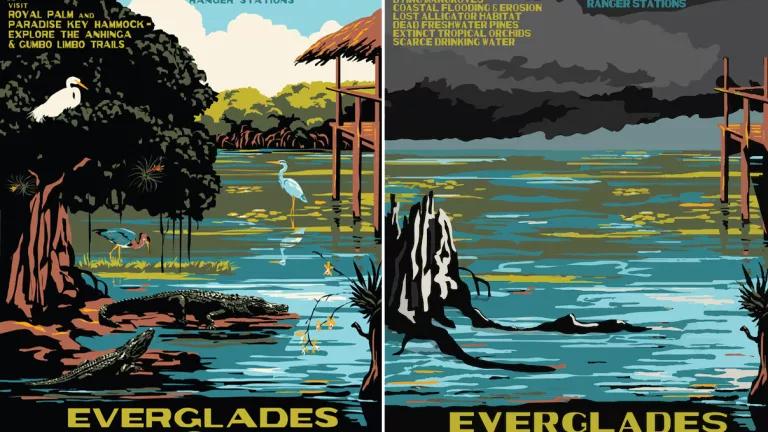An Artist Envisions Our National Parks in 2050
Hannah Rothstein’s grim tourism posters are a call to action, in a time when the president is pillaging our public lands.

At first glance, a print from artist Hannah Rothstein’s series “National Parks 2050” looks like one of the classic posters that Works Progress Administration artists created for the National Park Service between 1938 and 1941. The iconic landscapes are there, as are the characteristic bold colors and blocky text. But it doesn’t take long to realize that something is very wrong.
The grizzly bear advertising Yellowstone National Park is emaciated; the mangroves, alligators, and orchids have disappeared from the Everglades; and “the Great Smoky Mountains” becomes a literal description as an inferno consumes the pines. These are the sights Rothstein imagines park visitors can expect to see in a few decades if we fail to act on climate change now. It’s not pretty.


“One of my favorite ways to approach my art is to take an idea people are familiar with and present it in a new light,” Rothstein says. Much of the artist’s previous work borrows elements from pop culture and turns them on their head. When thinking about how to bring the same approach to a series about global warming, she remembered the WPA posters.
“It immediately clicked in my head that by reinventing those I could address climate change in a way that felt close to home and could help make the facts about climate change, which are easy to put in one ear and out the other, feel concrete and easy to understand,” she says.


For her series, Rothstein chose seven parks (in both red and blue states) that could represent a wide range of threats—from wildfires to invasive species to flooding. For each park, she researched site-specific climate change projections and read through scientific reports to figure out how to best reflect the looming dangers in her illustrations.
It’s jarring to see these vistas, which hold such a prominent place in American culture, in almost apocalyptic states of deterioration. Jarring enough, Rothstein hopes, to overcome the inertia around climate action.
“I want people to remember that it is possible to do something and, hopefully, to feel inspired to either call their senators and representatives or think about how they personally can work toward change—and fast,” Rothstein says.


She's making that simple for her fans. Twenty-five percent of the proceeds from the sales of “National Parks 2050” prints and paintings will be donated to climate-related causes.
Rothstein's call to action is all the more urgent as Trump moves to shrink or eliminate dozens of national monuments on protected public lands.
“It’s really easy to get caught up in the negative,” she says. “It’s important that we remember that if we act now . . . we can solve a lot.”
This article was originally published on onEarth, which is no longer in publication. onEarth was founded in 1979 as the Amicus Journal, an independent magazine of thought and opinion on the environment. All opinions expressed are those of the authors and do not necessarily reflect the policies or positions of NRDC. This article is available for online republication by news media outlets or nonprofits under these conditions: The writer(s) must be credited with a byline; you must note prominently that the article was originally published by NRDC.org and link to the original; the article cannot be edited (beyond simple things such grammar); you can’t resell the article in any form or grant republishing rights to other outlets; you can’t republish our material wholesale or automatically—you need to select articles individually; you can’t republish the photos or graphics on our site without specific permission; you should drop us a note to let us know when you’ve used one of our articles.

A Trailblazer for Tribal Sovereignty
Biodiversity 101
Five Indigenous Poets Explore Loss and Love of their Native Lands